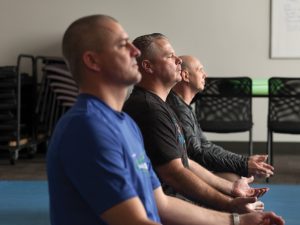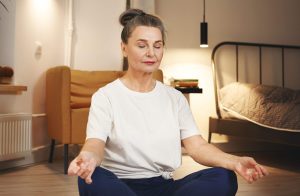Improve Sleep Quality in Patients with Severe Sleep Disturbance with Online Mindfulness Training.
By John M. de Castro, Ph.D.
“Strengthening your ‘mind muscle’ through daily practice helps you better recognize the negative insomnia-inducing thoughts and let them pass.” – Shelby Harris
Modern society has become more around-the-clock and more complex producing considerable pressure and stress on the individual. The advent of the internet and smart phones has exacerbated the problem. The resultant stress can impair sleep. Indeed, it is estimated that over half of Americans sleep too little due to stress. As a result, people today sleep 20% less than they did 100 years ago. Not having a good night’s sleep has adverse effects upon the individual’s health, well-being, and happiness. It has been estimated that 30 to 35% of adults have brief symptoms of insomnia, 15 to 20% have a short-term insomnia disorder, and 10% have chronic insomnia
Insomnia is more than just an irritant. Sleep deprivation is associated with decreased alertness and a consequent reduction in performance of even simple tasks, decreased quality of life, increased difficulties with memory and problem solving, increased likelihood of accidental injury including automobile accidents, and increased risk of dementia and Alzheimer’s disease. It also can lead to anxiety about sleep itself. This is stressful and can produce even more anxiety about being able to sleep. About 4% of Americans revert to sleeping pills. But these do not always produce high quality sleep and can have problematic side effects. So, there is a need to find better methods to treat insomnia. Mindfulness-based practices have been reported to improve sleep amount and quality and help with insomnia. The evidence has been accumulating. So, it makes sense to review and summarize what has been learned.
In today’s Research News article “The Effect of Virtual Mindfulness-Based Interventions on Sleep Quality: A Systematic Review of Randomized Controlled Trials.” (See summary below or view the full text of the study at: https://www.ncbi.nlm.nih.gov/pmc/articles/PMC8300082/ ) Jiang and colleagues review and summarize the published randomized controlled trials of the effectiveness of web based mindfulness training to improve the quality of sleep in patients with severe sleep disturbance. They found 10 published randomized controlled trials with a total of 2777 participants.
They report that the published research found that online mindfulness training produced significant improvements in sleep quality that were still present as long as 6 months later. Mindfulness training has been shown to improve sleep in a wide variety of patients and normal individuals. The present review demonstrates that it is effective with patients with severe sleep disturbance. The fact that these studies used online trainings is important as it makes the treatments widely available, convenient, and inexpensive. Hence, mindfulness training is a safe and effective method to improve sleep and should be recommended for individuals who have sleep problems.
So, improve sleep quality in patients with severe sleep disturbance with online mindfulness training.
“We cannot make ourselves sleep, but perhaps, by aiming to stay settled and getting less caught up in our thoughts, we fall asleep anyway.” – Mark Bertin
CMCS – Center for Mindfulness and Contemplative Studies
This and other Contemplative Studies posts are also available on Google+ https://plus.google.com/106784388191201299496/posts and on Twitter @MindfulResearch
Study Summary
Jiang, A., Rosario, M., Stahl, S., Gill, J. M., & Rusch, H. L. (2021). The Effect of Virtual Mindfulness-Based Interventions on Sleep Quality: A Systematic Review of Randomized Controlled Trials. Current psychiatry reports, 23(9), 62. https://doi.org/10.1007/s11920-021-01272-6
Abstract
Purpose of Review
We summarized peer-reviewed literature investigating the effect of virtual mindfulness-based interventions (MBIs) on sleep quality. We aimed to examine the following three questions: (1) do virtual MBIs improve sleep quality when compared with control groups; (2) does the effect persist long-term; and (3) is the virtual delivery method equally feasible compared to the in-person delivery method?
Recent Findings
Findings suggest that virtual MBIs are equivalent to evidence-based treatments, and to a limited extent, more effective than non-specific active controls at reducing some aspects of sleep disturbance. Overall, virtual MBIs are more effective at improving sleep quality than usual care controls and waitlist controls. Studies provide preliminary evidence that virtual MBIs have a long-term effect on sleep quality. Moreover, while virtual MBI attrition rates are comparable to in-person MBI attrition rates, intervention adherence may be compromised in the virtual delivery method.
Summary
This review highlights virtual MBIs as a potentially effective alternative to managing sleep disturbance during pandemic-related quarantine and stay-at-home periods. This is especially relevant due to barriers of accessing in-person interventions during the pandemic. Future studies are needed to explore factors that influence adherence and access to virtual MBIs, with a particular focus on diverse populations.
https://www.ncbi.nlm.nih.gov/pmc/articles/PMC8300082/









